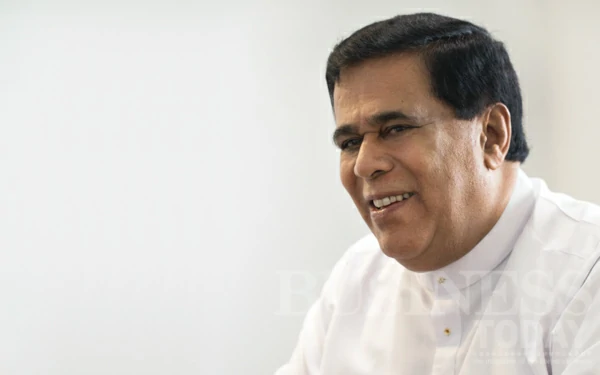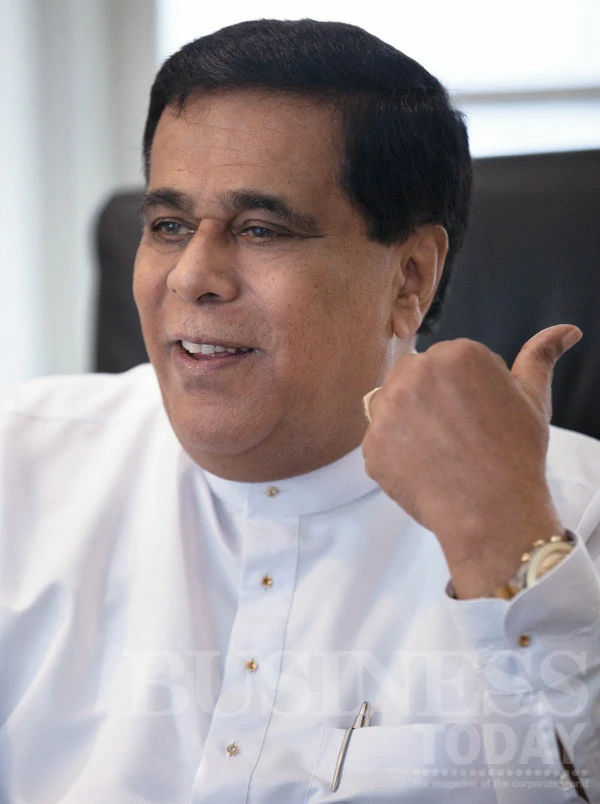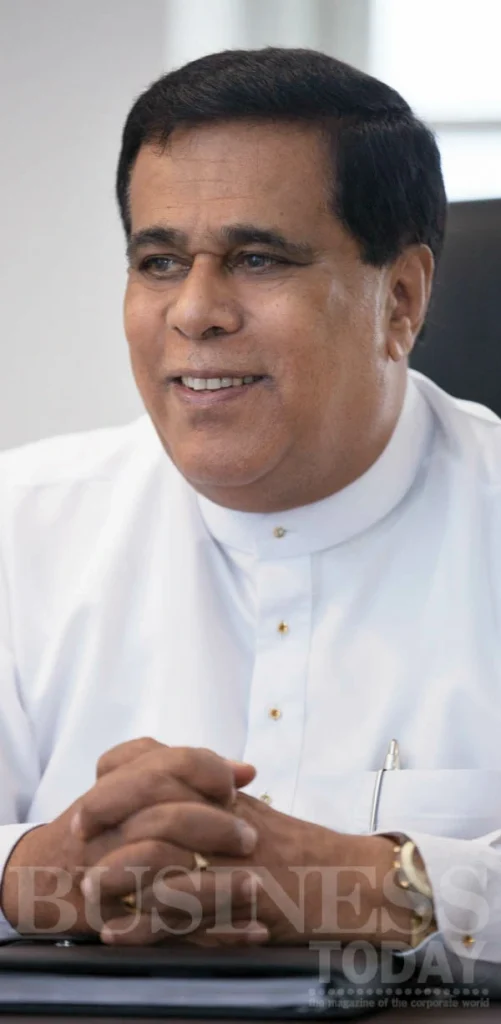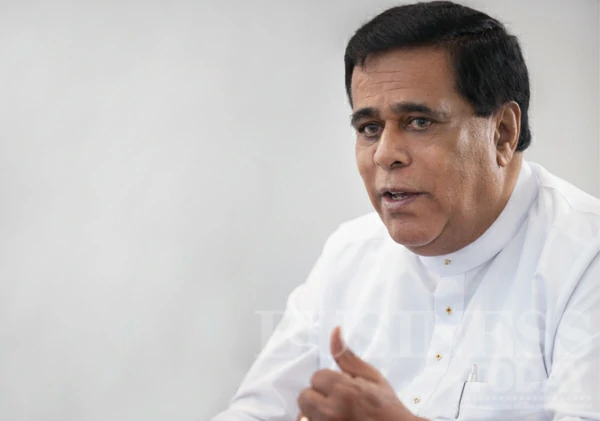
Nimal Siripala De Silva is the Leader of the Opposition representing the United People’s Freedom Alliance (UPFA). He is also a senior and well-respected member of the SLFP. The Leader of the Opposition holds a very unique position in the current Parliament as the President is from the SLFP and the government has members of both the UNP and SLFP. After a very long time Sri Lanka has an active Opposition. He speaks about the lessons learnt and what could be done differently. He says not to underestimate the strength of the UPFA, Nimal Siripala De Silva is confident that they will be back in power.
By Udeshi Amarasinghe
Photography Mahesh Bandara
What are your thoughts on being the Opposition Leader, when the government is a coalition between the SLFP and UNP and the President of the country is also the leader of the SLFP?
For people looking from the outside this may seem like an awkward situation. But this is a unique period in the political history of Sri Lanka. President Maithripala Sirisena who was elected by the people was the former Secretary General of the SLFP. He is a born and bred SLFPer who was supported by the SLFP vote base during his political journey of 30-35 years. Soon after becoming the President of Sri Lanka, Mr Maithripala Sirisena opted to take over the party to become the leader of the SLFP. As far as the SLFP is concerned we have always maintained the position that the executive presidency that gives enormous powers to a single individual should be abolished.
Mr Maithripala Sirisena was elected as the President with a 100-day programme to ensure that the government fulfilled certain promises to the people. One of the main areas was to curtail the power of the President even though he may not be able to completely abolish the executive presidency. A referendum is required to do so and the Supreme Court has given the same directive. He has done whatever possible within the scope of 2/3 majority of the parliament. He took a very rational decision to support the 19th Amendment. And now according to his manifesto a new electoral system has to be introduced, which we proposed should be a combination of the district preferrential vote system and past the post system. There will be a MP from the respective party responsible for the people of a particular electorate. There is a definite area with a specific number of people and the representative will be elected without the preferential voting system.
We Agreed Not To Topple This Government During The 100 Day Programme, When It Came Into Power. We Could Have Toppled The Government The Very Next Day By Bringing A Vote Of No Confidence Motion Against Mr Ranil Wickremesinghe. But Then What Would Have Happened? We Would Not Have Been Able To Curtail The Powers Of The President And Implement A Hybrid Electoral System.
The preferential voting system is costly and it is an aging system. It is very difficult to attract young people and professionals who do not have the money but the capacity to work in the political arena under the preferential voting system. They have to canvas in a very large area and spend massive sums of money for their campaigns. The SLFP thought it fit to support such a move to change the system because this is the most opportune moment in the history of Sri Lanka. The UPFA commands nearly 142 votes in parliament. There will never be such a political environment in the country again. Unless we make use of this opportunity to change the electoral system and curtail the powers of the preferential system we will never in future get a parliament with this composition where so many SLFP members will genuinely support these reforms and change.
My Personal View Is That We Should Not Have Held The Elections At That Time Because There Was A Lot Of Development Work Under The Mahinda Chintana That We Had Promised The People That We Would Do.
We agreed not to topple this government during the 100 day programme, when it came into power. We could have toppled the government the very next day by bringing a vote of no confidence motion against Mr Ranil Wickremesinghe. But then what would have happened? We would not have been able to curtail the powers of the president and implement a hybrid electoral system. We did not think about just coming into power even though the President is the leader of the SLFP. We took the necessary steps with him to make this important change, a principle that the SLFP has advocated for more than three decades.
As the Opposition Leader how does this all work for you?
Mr Maithripala Sirisena became the President of this country with UNP votes, part of the SLFP vote, JVP and other votes. Having been elected to the post of President in this manner, some may think that Maithripala Sirisena is a UNP President. But it is not so. He contested from an alliance not from the UNP. Thereafter, he took the leadership of the SLFP. With Mr Ranil Wickremesinghe as the Prime Minister of this minority government for a short period, he has fulfilled his obligations to the UNP voters. He gave his assurance to them for 100 days though the UNP led government has been in power for almost 169 days. Now his obligation is to the SLFP. He has very openly and clearly declared that he wants to form the next government with Mr Mahinda Rajapaksa and Madam Chandrika Kumaratunga where he will give the leadership to the SLFP to form the next government. That is his political vision
Was the Presidential elections held too early since there were two years more for President Mahinda Rajapaksa?
My personal view is that we should not have held the elections at that time because there was a lot of development work under the Mahinda Chintana that we had promised the people that we would do. We had fulfilled most of them but there were certain other things remaining. We had the majority in parliament. When we had the majority in parliament and executive presidential power with two more years to go in my view it was a wrong decision to go for an early election. But that was the decision of President Mahinda Rajapaksa.
The people are quite disheartened because everything seems to be at a standstill. What are your thoughts on this and what is the alternative for the people?
The United National Party and Mr Ranil Wickremesinghe projected an image that they are the people who could bring investors to the country, who could revitalise the private sector and ensure a form of good governance. They projected themselves as the viable alternative who are better than the Mahinda Rajapaksa regime. But what happened was that they proved to be a failure. They were talking so much about transparency but the greatest scandal in the history of this country was done under the UNP government. It was Mr Ranil Wickremesinghe who appointed Mr Arjuna Mahendran as the Central Bank Governor. There is a parliamentary COPE Committee currently looking into this matter. We are waiting for the COPE Committee report but from what has been discussed during the past few months it has been proven without doubt that the UNP government had no transparency in their activities. It is Mr Arjuna Mahendran’s son-in-law who is involved in the bond transaction where large concessions were given to him. The UNP did not deliver on their promises they did the exact opposite. As a result what happened? The interest rates went up and the confidence of the private sector and the investors diminished, confidence in the international monetary market wavered and people are looking at this government with suspicion. Then when we debated this issue in parliament they said the reason as to why the bonds were issued quickly was because they did not have any funds to pay the salaries. Mr Ravi Karunanayake when in the opposition used to say that they know how to get money for the government and that we don’t. But have they increased the revenue? Have they found new ways of securing funds for recurrent and capital expenditure? They too are floating bonds in the international market; except for borrowing there is no other magic way to get funds. In the area of financial control and fiscal policy this government has failed. As a politician I work with the grassroot levels. When I went for a meeting in Badulla, the elderly people were crying and coming to me asking for their monthly allowance of 2,000 rupees. Even that has not been paid. The grassroot level is severly affected by the current economic situation. They do not have the means to purchase food items or any of their requirements. What is the priority of the UNP government?
The United National Party Projected An Image That They Are The People Who Could Bring Investors To The Country, Who Could Revitalise The Private Sector And Ensure A Form Of Good Governance. They Projected Themselves As The Viable Alternative Who Are Better Than The Mahinda Rajapaksa Regime.
I raised this issue in Parliament and they gave a round about answer. It is a fact that allowances and salaries have not been paid up to now. What has happened to all the development work? Work has stopped. If you take the construction industry more than 100,000 people are out of jobs that is masons, carpenters, electricians and other skilled and non skilled workers. Roads and other infrastructure projects have been stopped both in the private and public sector. Ranil Wickremesinghe was boasting saying that he will create 1,000,000 jobs, we ask him what has he done in the past three months? He has not been able to create even 10,000 jobs. He has made more than 100,000 people jobless. This is the reality and that is why the private sector is angry. The confidence that the private sector had in the United National Party has completely eroded.
I come from an area where there are plantations with many small tea holdings, Badulla, Bandarawela, Hali Ela and Passara electorates. These small teaholders were promised 85 rupees per kilo. Last week I checked with the people and they said they got only 54 rupees for a kilo. These are all false promises. It is the same for the paddy, they promised 50 rupees but the farmer did not get that price. For rubber it is the same. All the promises given by the UNP have not been fulfilled so the people are angry.
All the development work has stopped, all the ports, highways, hospitals, buildings have been stopped. For example, in the Badulla electorate we started the construction of three bridges following the proper procedure but they have stopped construction and now the people cannot get across. Buses have to take a very long route. People are asking whether this is ‘Yahapalanaya’, which Ranil Wickremesinghe and the UNP were talking about. The people are getting ready to throw the UNP administration out. This is the practical scenario at the ground level.
The Alternative For The People Is To Bring The UPFA Back Into Power. The UNP Said Our Government Was Corrupt But How Many Have They Charged For Corruption? You Can Get On To The Platform And Say That A Person Is Corrupt But Those Are Merely Statements. They Should Prove It, Before A Court Of Law. But They Have Failed To Do So.
This government said that they will expose the people that have committed crimes and they established the Financial Crimes Investigation Division (FCID), which has also been challenged in the Supreme Court. This is not a legal entity and it is monitored and screened by a committee consisting of the Prime Minister. There is actual political interference in the area of law and justice. And do you know what happened as soon as this government came into power? One example is the incident in the Wattala Pradeshiya Sabha involving Mr John Amaratunga. Their good governance has never come to light and they have failed in this area too. If not for the support of the Opposition the 19th Amendment to the constitution would not have come into being. The UNP cheated us. They asked for our vote for the 19th Amendment and they said they will support the 20th Amendment. What are they doing now? They want to undermine the 20th Amendment. We are exposing that because the UNP, JVP, and all these parties show that they are for a hybrid electoral system when in reality they are not. They want to retain the present system.
That is the political equation they are fighting for and we want to change that equation. We want an electoral system without the preferential voting system so that there will be a member of parliament responsible for a particular electorate. As a senior politician this new system, which we have proposed, is not favourable for me because the composition of my electorate is more UNP but we are not thinking about self-preservation. I want to ensure even if I lose in the new system that comes into place because it will benefit the country to create a better political culture that we have been fighting for decades.
The alternative for the people is to bring the UPFA back into power. The UNP said our government was corrupt but how many people have they charged for corruption? You can get on to the platform and say that a person is corrupt but those are merely statements. They should prove it, before the court of law. But they have failed to do so. This shows that the charge of corruption is only a political slogan. They came into power promising a change where they claimed that the previous government was corrupt. But they have not been able to prove this. What are the cases? Mr Johnston Fernando has been remanded because his secretary has taken some goods from the CWE on a credit basis and it has already been paid. Any right thinking person will say that this is political victimisation. No offence has been committed. Then Mr Basil Rajapaksa, he has paid the retiring Samurdhi Niladaries from a certain fund. He did not put that money into his own account nor did he misappropriate the funds and the Treasury had given approval for him to pay the retiring officers till they provided the ministry with the required funds. All are bogusly created offences but are not offences under the law. The UNP government has failed to demonstrate and prove that the previous regime was corrupt.
I Feel Although Mr Mahinda Rajapaksa Was Defeated He Has A Very Wide Vote Base In The Country And People Like Him. Mr Maithripala Sirisena Is The Incumbent President Of The Country And The President Of The Party And If He Can Get All Forces Together Then We Can Defeat The UNP.
Many public officials have resigned, as they cannot withstand the political pressure. There have been a great deal of political victimisation and witch hunts but I must thank our President Maithripala Sirisena because when we pointed out certain things he was able protect our people. For example he stopped the police transfers, then at the Tourist Board and RDA they fired about 180 people, the President reinstated them. At the CTB and Railway, political victimisations are still going on. These ministries are under UNPers. Mr Sajith Premadasa is distributing the Samurdhi money to UNP supporters and I raised that issue in Parliament and there is court case pending. The FCID should investigate him for what is being done. He has clearly violated all norms and regulations. He is doing this for political gain.
There have been many who say that the Opposition Leader should not be from the SLFP. What are your thoughts on this?
I wish to recall that when 17 members of the UNP joined the Mahinda Rajapaksa government, it was Mr Ranil Wickremesinghe who remained as the Leader of the Opposition. In fact if a section of the members of a political party join the government and obtain ministerial portfolios it does not prevent the remaining group of that party to stay in the Opposition and declare one of their members to be the Leader of the Opposition.
This position has been recognised by the Honourable Speaker. I come from the UPFA. The secretary of the UPFA has clearly stated that the consensus in the UPFA is that I should be the Leader of the Opposition. Though there were various moves to change me, the Speaker has not made any changes. I am the legally appointed Leader of the Opposition. And I feel that I have all the right to be in this position. I have been in politics for the last 35 years. I have been the Leader of the House and Senior Vice President of the SLFP. The SLFP is the majority partner in the UPFA. I have an unblemished record and I have not gone to any other party during my 35-40 years of politics. I feel that I am suitable for this position. The Honourable Speaker has recognised me in terms of Parliamentary practice.
For the first time in a long time the Opposition is very active both inside and outside parliament?
Yes, when the bond issue came up, we led the campaign. We marched to the Central Bank and picketed. We have been very active inside and outside the Parliament. I am happy that we have a very vibrant and active opposition.
As a senior and respected member of the SLFP what are your thoughts on the current situation of the party? It is divided, why is that?
I am being very frank when I say that we currently have a problem in the party. We are trying to sort it out. The SLFP is a party that emerges strongly out of problematic situations. For example after the defeat in 1978 the party was divided, the Anura-Maithri group, Sirimavo Bandaranaike group and other groups were there. I remember as a young lawyer we fought the cases and thereafter we merged together. Then with Madam Chandrika Kumaratunga, Vijaya Kumaratunga and T B Illangaratne there was another split where they formed the Sri Lanka Mahajana Party. This is not something new for the SLFP. Whenever there is a defeat the party shakes to some extent but we come back victorious. Therefore I feel although Mr Mahinda Rajapaksa was defeated he has a very wide vote base in the country and people like him. Mr Maithripala Sirisena is the incumbent President of the country and the president of the party and if he can get all forces together then we can defeat the UNP hands down without any problem and that is what we are trying to do. That is our vision, we must bring all our forces together to defeat the UNP. I am confident that we can bring the party together before the next General Election.
The SLFP Has Gone Through The Test Of Time. And We Have Been Able To Adjust Our Political Work In Such A Way To Emerge Victorious Even Under Difficult Circumstances…It Is The Fervent View Of The SLFP And The UPFA That We Can Bring Back The Postive Outlook Once Again.
The future of the party is intact. The party has gone through various turmoils within the last three decades. Mr Bandaranaike came into power, he was assassinated, then Madam Bandaranaike took over, then we won some elections and then we were defeated, again we came back in 1970 and again we were defeated, then we were in the opposition for 17 years and then we emerged victorious. Then again in 2001 we were defeated and in 2005 we came back. In the political arena you cannot always win. But the SLFP has gone through the test of time. And we have been able to adjust our political work in such a way to emerge victorious even under difficult circumstances.
At the forthcoming general elections how will the party contest?
The SLFP will contest as a partner of the UPFA. We must be very clear, that when we contested without the left parties, it was very difficult to gain power and we have learnt that lesson. We must keep all the forces together.
Does the country have a positive outlook?
We had a positive outlook but that has been tarnished during the last few months under the UNP regime. But it is the fervent view of the SLFP and the UPFA that we can bring it back once again, when the UPFA comes back to power in the next general election.








